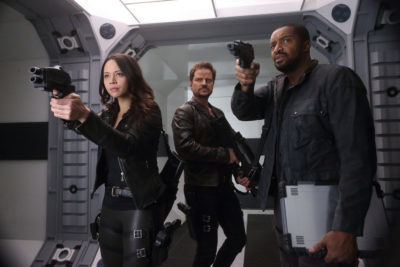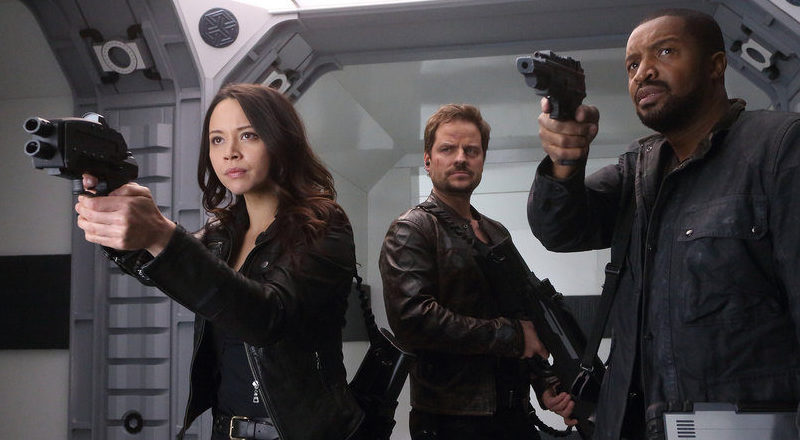INTERVIEW: Joseph Mallozzi sheds light on ‘Dark Matter’ season three

Dark Matter returns Friday, June 9 at 8 p.m. to Syfy for a third season that finds the crew members facing their toughest challenges yet. Fans have been waiting many months to find out what might have happened after the EOS-7 exploded, potentially taking with it many of the main characters.
With so many questions to be answered, executive producer and co-creator Joseph Mallozzi has been a busy man. The Stargate alumnus is at the helm of the series with his fellow co-creator, Paul Mullie. Together they have crafted a story involving a crew of mysterious characters who wake up from stasis with no idea who they are and what they’ve done. Episode by episode, over the course of the show’s first two seasons, the characters unearthed details of their former selves. Because they were unaware of their true identities, they called one another by numbers, One through Six.
Recently, Hollywood Soapbox spoke with Mallozzi about season three, and in this revealing interview, he offers some tantalizing bits about what fans can expect this summer. Here’s what he had to say …
On what happened during the EOS-7 explosion …
“You’ll get answers right off the bat for the most pressing question: Who survived the EOS-7 explosion? And we’re headed into corporate war and how that will affect the grand scheme of things, the Galactic Authority, the various corporate entities, the various colonies, just kind of regular folks, and that’s a lot of what we’ll exploring in season three. While the war will be present, we’ll also continue telling the type of stories that will offer insight into the various back stories of the characters, revelations, our trademark twists and turns, action, adventure.”
On developing the structure for the show …
“Personally, I love it simply because I have answers for all the questions we set up, so a lot of the stuff we set up, we’ve kind of answered along the way. … I think serialized storytelling allows you to create such a detailed world but also really detailed characters as well offering back stories and sort of building on relationships. It’s the type of storytelling that maybe 10 years ago wasn’t in fashion unless you were watching cable, and when I thought the type of show I wanted to make, I thought to the type of shows I like to watch, like The Shield, The Sopranos, Breaking Bad. And when it came time to create the show, I developed it with those shows in mind. …
“Basically, stuff happens in every episode. Fans will get some sort of payoff in every episode, and more importantly though, we’re seeding clues along the way, but clues that will pay off down the line.
“An example is little things like in season one, episode three, the Android is going to go off and do a [mission], and Two wishes her luck and says, ‘Good luck. You have to come back. We can’t do this without you.’ And the Android says, ‘Well, you can,’ in sort of a pointed way. And I remember being on the boards, and some of the fans were going, ‘Is it strange sort of the way the Android sort of addressed Two? She seems to be hinting at something there.’ And a bunch of other fans were like, ‘Oh, you’re just reading too much into it.’ And, of course, you find out that essentially she is referring to the fact that Two is more than your average human. It’s a subtle thing, but it’s something that we pay off.”
On the type of storytelling he dislikes …
“There’s nothing I find more annoying than watching a show and being very invested in it, and sort of as time goes on, you begin to realize, these guys are just making it up as they go along. This contradicts something that happened earlier, and you realize basically there is no plan. I assure you we have a plan. We actually have a five-year plan. We know exactly where the series is going to end up. We know how each of our characters’ journeys will end. Something we said when we first started the show: There’s not going to be a happy ending for everybody. But when is it?”
On Four’s dark side …
“His dark side turn was planned really from the show’s concept, and how that develops and how it ends up is something we have in mind. Like I said, we know how each season will begin and end. We know how each character story will begin and end.”
On possible changes to his original plans for the series …
“It’s always nice to see characters that fans respond to. It’s no secret that the Android is a fan favorite, so that’s one more reason to want to write for the Android. Zoie Palmer is amazing in the role, and she’s fashioned such an amazing character. It really comes from watching the show and watching the performances, and seeing how the characters interact. …
“I use Zoie Palmer as an example. The character of the Android was originally envisioned — although we kind of had the backstory planned — she was meant to be really more of a supporting character to the crew … So I decided, you know what, why don’t I write an extra Android scene here just because I so enjoyed what Zoie did with the character, and so basically we ended up creating or fleshing out this story for her, this arc for her over the course of season one that really allowed us to kind of set the tone for season two and explore it even further in season three. We finally get her backstory. We find out about her connection to Two prior to her mind wipe, and she’s really become a member of the family.”
On choosing which episodes to write and which to pass off to other writers …
“It really depends. Paul is my longtime writing partner, and we developed the show together. We write five each. … The 13 scripts go out to people who are on the show or more sort of freelancers, but I tend to rewrite everything. So at the end of the day, I guess it doesn’t really matter. …
“I will take on the episodes that have more to do with character revelations. For example, episode 10 I wrote. We delve into the Android’s backstory. We delve into Two’s backstory. Episode 12 is an episode where we learn some huge secrets about the characters’ backstories. It’s very much a character-driven episode, and actually we also do two more comical episodes.”
On season three’s time loop episode …
“Every sci-fi show has done a time loop episode, so basically in preparation I ended up watching a dozen time loop movies and two dozen different time loop episodes for various sci-fi or fantasy shows, so I could inform myself and do a Dark Matter version of the time loop. And, of course, basically if any character is going to be caught in a time loop, it really needs to be Three because Anthony Lemke has such great comic timing.”
On another episode in season three that incorporates 2017 …
“It’s kind of another time travel episode where it finds our crew traveling back to 2017 and having to go undercover in Fort Falls, Wisconsin, as a typical suburban family. Those two episodes [time loop episode and time travel episode] stand out for me as the type of episodes where if you’re not familiar with the show, you tune in, I think you’re going to be pleasantly surprised. So if you have any friends who haven’t watched the show, circle episode four and episode nine, especially episode nine, on your calendar.”
By John Soltes / Publisher / John@HollywoodSoapbox.com
Dark Matter returns for season three Friday, June 9 at 8 p.m. on Syfy. Click here for more information.

